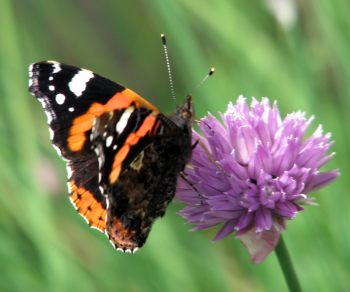Growing Chive
(tips on growing chive in your garden)

Chive offers a uniquely fresh and mild onion taste to many of our favorite dishes. Sprinkled on top of a baked potato or scrambled eggs are two of our favorites.
If you plan on growing them in your herb garden, you might want to first check out our guide on growing chives and our companion planting guide. But first, be sure to check out the rest of this page which shares information on chive companion planting.
Chive Companion Planting
Adding chive to your garden where you grow parsley, broccoli, cabbage, eggplant, kohlrabi, mustard, peppers, potatoes, rhubarb, roses, squash, strawberries or tomatoes will help those plants. Companion planting chive with carrots will improve both the growth and flavor of your carrots. Grapes benefit from chive’s ability to repel aphids.
Beets and carrots are good companion plants for chives. When chives are planted near carrots that have been allowed to bloom, it confuses both onion and carrot flies. Wild carrot or Queen Anne’s Lace will provide a lovely addition to your garden and provide the same benefits.
Chive companion planting asparagus, beans, peas and spinach is not recommended.
Companion Planting Chives as Disease Control
Chives will help prevent both apple scab disease and black spot on your roses but the plants may need to be several years old before becoming effective.
Chive tea, made from boiling chopped chives in water, can be used to help combat downy and powdery mildew on cucumbers and gooseberries.
Chive & Insects
Chive is believed to repel a number of harmful insects including aphids, beetles, cabbage worms, Japanese beetles and slugs.
Additional Chive Information
(Allium schoenoprasum)
To learn more about growing chive be sure to check out our chive fact sheet.